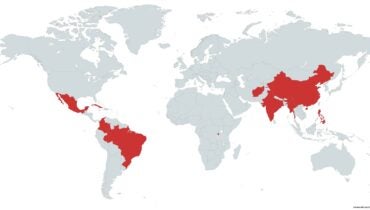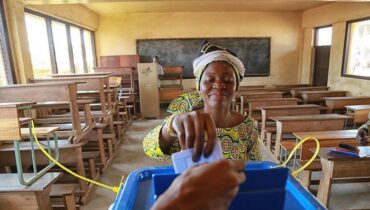Around the world, women’s and feminist movements continue to struggle to obtain the same rights and opportunities as men in areas such as education, health, work, and politics. Today, women’s right to vote is constitutionally guaranteed in all Latin American countries, and studies show that men and women vote in similar proportions. However, the opportunity for women to be elected to office is not equal to men. Research demonstrates that political socialization, resources, clientelism, and party systems impede women’s representation. Additionally, scholars have started to investigate sexual harassment in politics as a further barrier that remains largely unaddressed by political parties.
Several scandals of sexual harassment in the Colombian Congress have put the topic in the spotlight. The media and feminist movements have been pressuring the government to take action, particularly given the fact that the government was elected in part to represent women’s interests. In response to these calls, President Gustavo Petro requested that Senator María José Pizarro initiate a commission to address the allegations of sexual abuse, harassment, and violence perpetrated by congressmen against their women staff. However, this is only the tip of the iceberg of a much deeper problem. Men’s harassment of women in politics goes beyond the corridors of the parliaments, the offices of congressmen, or the social spaces that their advisors frequent. It extends into the upper echelons of political parties, in the candidate selection processes, in campaign periods and, in general, in partisan institutions.
Sexual violence in politics is often considered a ‘hidden’ form of violence, as it is difficult to observe and measure. In addition, neither the victims nor the parties involved have incentives to report incidents, making it extremely challenging to track the problem. Victims who speak out risk losing their political benefits within their party, while leaders who accept and denounce such incidents may face a significant reputational cost in the form of losing votes. As a result, we often only know about these issues from individuals who are no longer in Congress or victims who are no longer working under their aggressors.
To begin uncovering this problem, together with the Electoral Observer Mission in Colombia, Luisa Salazar-Escalante, Viviana Sarmiento, and I designed and implemented a candidate survey asking about experiences of election violence, including sexual violence, in the 2022 parliamentary elections. The survey was sent to approximately 3,000 women and men candidates. We obtained a good response rate (20%) and a representative sample of a diverse slate of candidates. Alarmingly, 19% of the candidates reported having suffered sexual harassment during their campaign. When disaggregated by gender, 33% of women respondents claimed to have been sexually harassed, compared to 8% of male respondents.
Are these figures higher than we would expect? To determine the significance of the reported figures for sexual violence, it is helpful to have a point of reference. In a similar survey conducted in Mexico in 2021, 17% of women candidates for the national parliament reported having suffered sexual harassment during their campaign.[1] In the United Kingdom in 2019, only 5% of women candidates reported having experienced violence during their campaign.
In comparison, the share of women candidates in Colombia reporting sexual violence is twice as high as in Mexico and five times as high as in the UK.
It is important to note that our study does not allow us to identify the perpetrators. We do not know if the perpetrators of sexual violence were rival candidates, voters, members of armed groups, or even party colleagues. Given previous research showing that sexual violence occurs most frequently in private spaces and male-dominated networks, it does not seem unreasonable to suggest that many of these women have suffered this violence while obtaining economic or political support for their campaigns from their leader parties and colleagues. Talking to more than 90 men and women candidates over the last six months, I collected testimonies that confirm these dynamics.
Campaign endorsement in Colombia is often defined by the degree of proximity the candidate has to a political leader. That is, proximity to a political leader is more important to obtaining endorsements than candidates’ capabilities, skills, or political experience. Endorsement decisions and political support are often made behind closed doors and away from public scrutiny. This practice puts women party members at risk of sexual violence because the political leaders can abuse their power and sexually extort women candidates seeking endorsements. Demanding sexual favors and threatening to withdraw support if the demand is not met is not unique to politicians in Colombia. Internationally, we have seen examples of how party leaders have perpetrated sexual violence against women party members in countries like France and the UK.
This problem needs more political attention from policymakers, the international community, and party elites to ensure women are not impeded or discouraged from entering politics. As the number of women entering the political realm increases, rates of sexual harassment from men party leaders could also rise if the issue is not addressed and accountability measures are not put in place. In our survey, we observed that women candidates reported less (26%) to official authorities than men candidates (28%) about their violent experiences during the campaign. Thus, in Colombia and elsewhere, efforts to address violence against women in politics, particularly sexual violence, should be attentive to the role of political parties and party leaders.
Democratizing and regulating political parties in Colombia would create greater transparency around candidate selection and could also mitigate the risks of sexual violence against women in politics. Parties should adopt formal and clear codes of conduct that prohibit male leaders from extorting women candidates seeking endorsements and develop accountability mechanisms if breaches occur. But the solution is not only in creating new rules on paper; changes to written policies must also be accompanied by cultural changes among men politicians. The fight to eliminate sexual violence against women in politics requires the active engagement of men as agents of change to challenge and transform these norms and to become allies in confronting abuses of power by their male colleagues.
[1] Collignon, Sofia and Piscopo, Jennifer M. (2022) Gendered Vulnerabilities: Perceptions of Political Violence among Mexican Politicians. Working Paper presented at the European Conference on Gender and Politics in the European Consortium for Political Research.


